

0


0

FOOD
By Deepa Natarajan
13 October, 2018
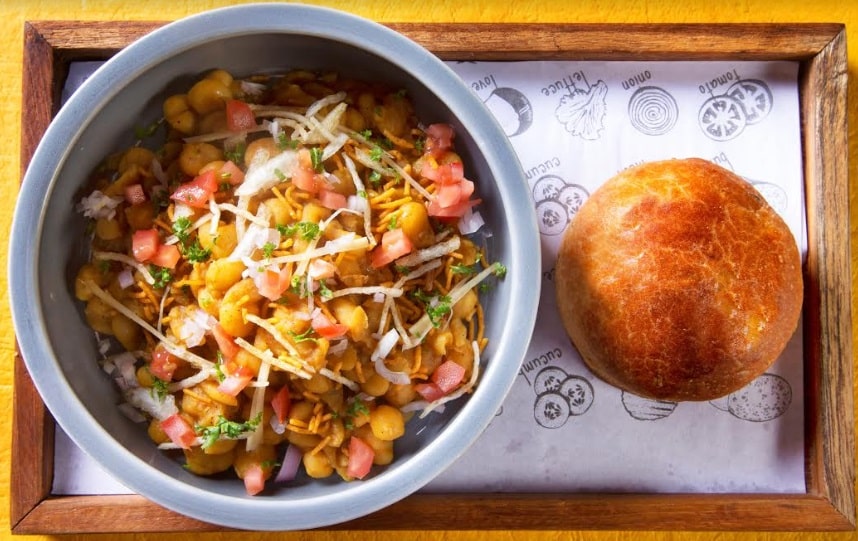
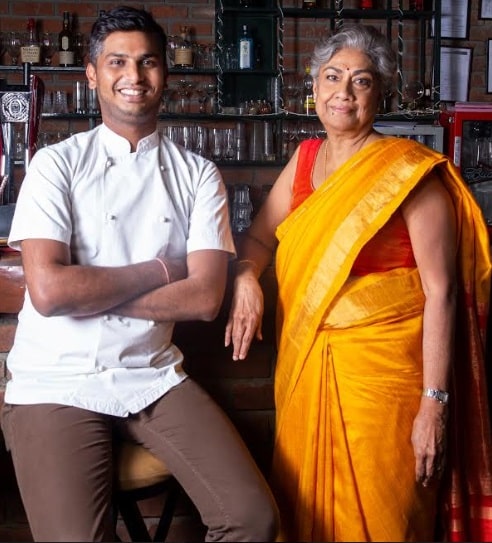 Iti Misra and Chef Dheeraj
An amalgamation of street foods from various parts of India and the world, Kolkata’s street food scene is as alive as the sparkling waters of River Hooghly at sunset. So no wonder why food is as inevitable a part of the itinerary of most travellers who visit Kolkata as the Victoria Memorial. Capturing this wonderful essence of the city is Iti Misra, a home cook and long-time resident of Kolkata, who has curated the menu for ‘Next Stop Kolkata’, a Bengali street food festival that is on at Monkey Bar (Delhi, Mumbai, Kolkata and Bengaluru) all day till October 21.
Iti Misra and Chef Dheeraj
An amalgamation of street foods from various parts of India and the world, Kolkata’s street food scene is as alive as the sparkling waters of River Hooghly at sunset. So no wonder why food is as inevitable a part of the itinerary of most travellers who visit Kolkata as the Victoria Memorial. Capturing this wonderful essence of the city is Iti Misra, a home cook and long-time resident of Kolkata, who has curated the menu for ‘Next Stop Kolkata’, a Bengali street food festival that is on at Monkey Bar (Delhi, Mumbai, Kolkata and Bengaluru) all day till October 21.
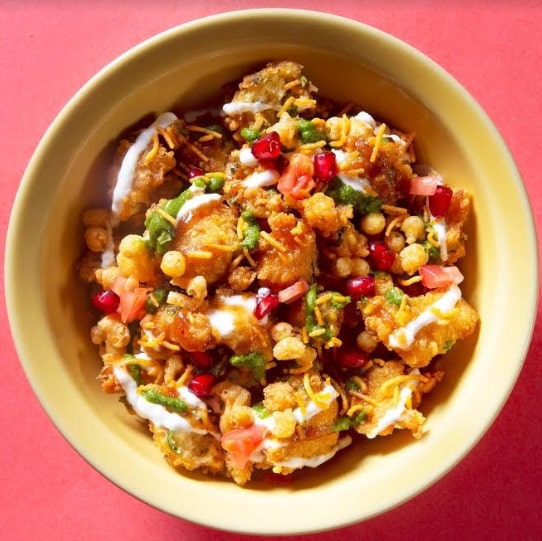 Vardaan Market Moong Daal Pakodi Chaat
Over the different periods of history, Kolkata has played home to various communities like Mughals, Chinese, Tibetans, Awadhs and Gujaratis and Iti explains that what sets the city’s street food apart is the beautiful cosmopolitan mix that it is. “In my growing up years in the late 40s and early 50s, street food was restricted to ‘puchkas’, ‘jhal muri’ and hot ‘aloo chaat’. I remember eating ‘jhal’ on the pavement after school or escaping from school to relish some ‘puchkas’. Street food wasn’t such a big part of the culture back then but over the years, it has become more complex. It has also become more accessible which is great,” says Iti, who made a blueprint of the various landmark areas of the city and took Chef Dheeraj Varma, Head Chef, Monkey Bar, along. “We had a wonderful time relishing the various dishes and the menu boiled down to ten items, from a list of around 25, which we felt were consolidated, thoughtful inventions. We added whatever we thought we could elevate in terms of flavour,” explains Dheeraj.
Vardaan Market Moong Daal Pakodi Chaat
Over the different periods of history, Kolkata has played home to various communities like Mughals, Chinese, Tibetans, Awadhs and Gujaratis and Iti explains that what sets the city’s street food apart is the beautiful cosmopolitan mix that it is. “In my growing up years in the late 40s and early 50s, street food was restricted to ‘puchkas’, ‘jhal muri’ and hot ‘aloo chaat’. I remember eating ‘jhal’ on the pavement after school or escaping from school to relish some ‘puchkas’. Street food wasn’t such a big part of the culture back then but over the years, it has become more complex. It has also become more accessible which is great,” says Iti, who made a blueprint of the various landmark areas of the city and took Chef Dheeraj Varma, Head Chef, Monkey Bar, along. “We had a wonderful time relishing the various dishes and the menu boiled down to ten items, from a list of around 25, which we felt were consolidated, thoughtful inventions. We added whatever we thought we could elevate in terms of flavour,” explains Dheeraj.
 Beadon Street Fish Roll by Monkey Bar
The delicious dishes – named after the bustling lanes of the city like the Beadon Street Fish Roll (reflecting the British influence on the city) and the Vivekanand Park Ghoogni – are sure to leave your taste buds asking for more! “The Vivekanand Park is a place where young boys and girls enjoy going on dates. Since they can’t afford to go to a restaurant and have a fancy meal, they have a nice ‘chaat’ like ghoogni which is reasonable and filling,” explains Iti serving the steaming hot, wholesome preparation of curried white peas topped with some fried curry leaves, potato ‘salli’, onions and green chillies. Served with a masala brioche, it is a perfect blend of the classic and the contemporary.
Beadon Street Fish Roll by Monkey Bar
The delicious dishes – named after the bustling lanes of the city like the Beadon Street Fish Roll (reflecting the British influence on the city) and the Vivekanand Park Ghoogni – are sure to leave your taste buds asking for more! “The Vivekanand Park is a place where young boys and girls enjoy going on dates. Since they can’t afford to go to a restaurant and have a fancy meal, they have a nice ‘chaat’ like ghoogni which is reasonable and filling,” explains Iti serving the steaming hot, wholesome preparation of curried white peas topped with some fried curry leaves, potato ‘salli’, onions and green chillies. Served with a masala brioche, it is a perfect blend of the classic and the contemporary.
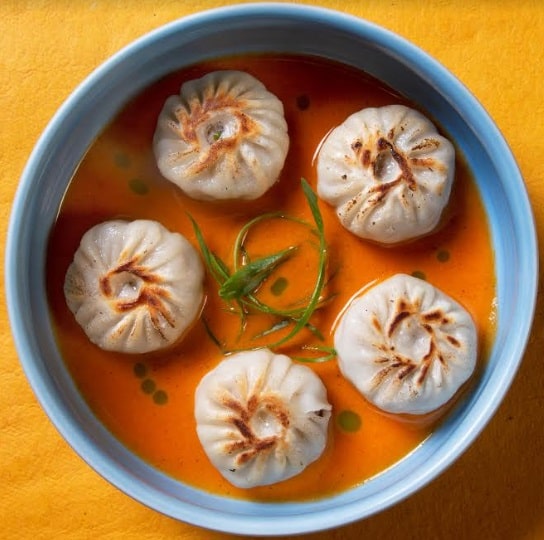 Elgin Road Pork Momos
As you take a bite of the crisp ‘moong daal pakodi chaat’ with its flavourful crisp curry leaves, ‘khatta meetha chutney’, yoghurt and ‘aloo bhujiya’, it’s as if you are taking a break from your shopping spree in Vardaan Market to energise yourself with a tangy roadside snack. And how can anyone miss the influence of the Chinese and Tibetans on Kolkata? “The Chinese and Tibetans came to Kolkata via Nepal and today, Indian Chinese is almost a cuisine by itself,” says Iti in jest. The Tiretti Bazaar Prawn Dumplings (wok tossed in honey and soy sauce) and Elgin Road Pork Momos (resting on a bowl of spicy, smoked tomato chutney) speak volumes of this perfect amalgamation of Indian and Oriental flavours.
Awadhi cuisine too finds an important place in the food of Kolkata. The story goes that after his kingdom was annexed by the British Empire in 1856, Wajid Ali Shah, the Nawab of Awadh, was exiled to Kolkata where he spent the rest of his life. As he brought a set of people with him, together they left a deep imprint on the culinary map of the city.
Elgin Road Pork Momos
As you take a bite of the crisp ‘moong daal pakodi chaat’ with its flavourful crisp curry leaves, ‘khatta meetha chutney’, yoghurt and ‘aloo bhujiya’, it’s as if you are taking a break from your shopping spree in Vardaan Market to energise yourself with a tangy roadside snack. And how can anyone miss the influence of the Chinese and Tibetans on Kolkata? “The Chinese and Tibetans came to Kolkata via Nepal and today, Indian Chinese is almost a cuisine by itself,” says Iti in jest. The Tiretti Bazaar Prawn Dumplings (wok tossed in honey and soy sauce) and Elgin Road Pork Momos (resting on a bowl of spicy, smoked tomato chutney) speak volumes of this perfect amalgamation of Indian and Oriental flavours.
Awadhi cuisine too finds an important place in the food of Kolkata. The story goes that after his kingdom was annexed by the British Empire in 1856, Wajid Ali Shah, the Nawab of Awadh, was exiled to Kolkata where he spent the rest of his life. As he brought a set of people with him, together they left a deep imprint on the culinary map of the city.
 Chitpur Road Chicken Rezala
Of these, the Chitpur Road Chicken Rezala has made it to the menu and is chef Dheeraj’s recommendation. The mildly flavoured white chicken curry, made with cashew and poppy seed paste and delicate spices, is served with ‘teen kona porota’. “It’s the perfect example of the influence of Awadhi cuisine on Kolkata and when Iti aunty shared this recipe with me, I thought it was fabulous. It just needs five to six ingredients and it’s a rare occasion when a recipe is so simple yet the end product is so flavourful.”
Chitpur Road Chicken Rezala
Of these, the Chitpur Road Chicken Rezala has made it to the menu and is chef Dheeraj’s recommendation. The mildly flavoured white chicken curry, made with cashew and poppy seed paste and delicate spices, is served with ‘teen kona porota’. “It’s the perfect example of the influence of Awadhi cuisine on Kolkata and when Iti aunty shared this recipe with me, I thought it was fabulous. It just needs five to six ingredients and it’s a rare occasion when a recipe is so simple yet the end product is so flavourful.”
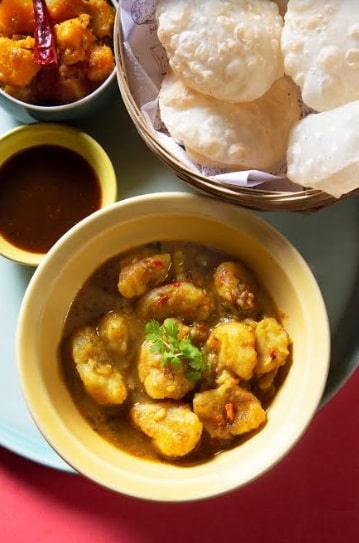 College Street Hing-er Kochuri
The Esplanade Mughlai Porota (stuffed with egg or mutton ‘kheema’ filling) served with ‘paanch phoron’ baby potatoes is a heavy, delicious meal. Then there is the Girish Park-er Shoitan Deem, a Scotch egg ala Kolkata style. Deep fried six-minute egg encased in ‘shammi kebab’ mince and served with pickled onions, this dish is an ode to the many road-side ‘tele bhaja’ shops of the City of Joy. Veggies can rejoice the Quintessential College Street Hing-er Kochuri, which is a deep fried thin ‘kochuri’ with a spicy potato curry and sweet and sour red pumpkin which takes you on a dreamy visit to Putiram Sweets on College Street.
College Street Hing-er Kochuri
The Esplanade Mughlai Porota (stuffed with egg or mutton ‘kheema’ filling) served with ‘paanch phoron’ baby potatoes is a heavy, delicious meal. Then there is the Girish Park-er Shoitan Deem, a Scotch egg ala Kolkata style. Deep fried six-minute egg encased in ‘shammi kebab’ mince and served with pickled onions, this dish is an ode to the many road-side ‘tele bhaja’ shops of the City of Joy. Veggies can rejoice the Quintessential College Street Hing-er Kochuri, which is a deep fried thin ‘kochuri’ with a spicy potato curry and sweet and sour red pumpkin which takes you on a dreamy visit to Putiram Sweets on College Street.
 Vivekanand Park Ghooghni
Down these with some heady cocktails which too are a reflection of the streets of Kolkata like the ‘Piara Peara’, the liquid version of the chilli guavas served on the streets; the ‘Puchka Pani Capriojka’ which in chef’s words is a spicy, ‘masaledaar’ mix of vodka and the mouth-watering ‘puchka pani’ better known in South as the ‘pani puri’ water or the flavourful ‘Thaand Cha’, a vodka and spice infused Darjeeling tea.
While Durga Puja isn’t really known for any dish in particular except probably the elaborate ‘thaalis’, according to Iti, “How can you have any celebrations without food? Durga Puja is that time of the year when people are out on the streets and there is no fixed meal time. People go ‘pandal’ hopping from 12 pm to midnight and eat whenever they feel hungry. But whether you are from Kolkata or have any connections to it or simply, just wishing to visit the place someday, we have tried to bring Kolkata closer to you.”
We totally agree to Monkey Bar on this!
For more interesting content and interviews, follow our online digital magazine BananiVista. You can also “Like” and “Follow us” on Facebook.
Vivekanand Park Ghooghni
Down these with some heady cocktails which too are a reflection of the streets of Kolkata like the ‘Piara Peara’, the liquid version of the chilli guavas served on the streets; the ‘Puchka Pani Capriojka’ which in chef’s words is a spicy, ‘masaledaar’ mix of vodka and the mouth-watering ‘puchka pani’ better known in South as the ‘pani puri’ water or the flavourful ‘Thaand Cha’, a vodka and spice infused Darjeeling tea.
While Durga Puja isn’t really known for any dish in particular except probably the elaborate ‘thaalis’, according to Iti, “How can you have any celebrations without food? Durga Puja is that time of the year when people are out on the streets and there is no fixed meal time. People go ‘pandal’ hopping from 12 pm to midnight and eat whenever they feel hungry. But whether you are from Kolkata or have any connections to it or simply, just wishing to visit the place someday, we have tried to bring Kolkata closer to you.”
We totally agree to Monkey Bar on this!
For more interesting content and interviews, follow our online digital magazine BananiVista. You can also “Like” and “Follow us” on Facebook.